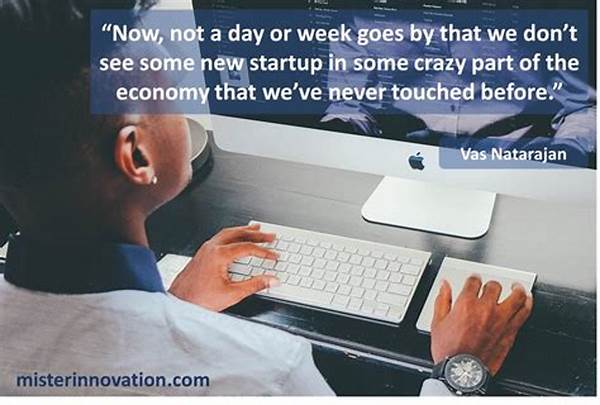In the dynamic world of startups, where agility and innovation are paramount, collaboration stands as a critical factor for success. The ability to collaborate effectively can influence the trajectory of a startup by enhancing creativity, improving efficiency, and driving growth. This article delves into effective collaboration strategies for startups, providing a comprehensive guide to navigating the complexities of teamwork in the evolving business landscape.
Read Now : Collaborative Historical Analysis Methods
Importance of Communication
Communication forms the backbone of any collaborative effort and is, therefore, a pivotal element of effective collaboration strategies for startups. A startup environment, often characterized by lean teams and fast-paced decision-making, necessitates clear and open channels of communication. This ensures that all team members are aligned with the startup’s goals and understand their roles and responsibilities. Regular meetings, feedback sessions, and the use of collaborative tools like Slack or Trello can enhance transparency and foster a culture of open dialogue. By prioritizing effective communication, startups not only mitigate the risk of misinterpretations and conflicts but also cultivate an environment of trust and mutual respect. Consequently, this enables each team member to contribute optimally toward the shared objectives.
Building a Collaborative Culture
1. Establishing a shared vision is fundamental to effective collaboration strategies for startups as it aligns all team members with the overarching goals, thereby fostering unity and purpose.
2. Empowering team members by recognizing their contributions and involving them in decision-making processes strengthens collaboration by encouraging ownership and accountability.
3. Utilizing collaboration tools can significantly enhance collective efficiency, as they facilitate real-time communication and streamline project management tasks crucial for startups.
4. Diversity and inclusion are essential components of effective collaboration strategies for startups, as a diverse team brings a wide range of perspectives and solutions.
5. Regular training and development opportunities help in enhancing the skills necessary for collaboration, ensuring that team members are well-equipped to tackle challenges.
Leveraging Technology
In today’s digital era, technology plays an indispensable role in enabling effective collaboration strategies for startups. From project management software to communication platforms, the right technological tools can seamlessly integrate team functions and enhance productivity. Utilizing cloud-based platforms allows team members to collaborate in real-time, irrespective of geographical boundaries, thus breaking down traditional barriers imposed by physical locations. Furthermore, artificial intelligence and automation can streamline repetitive tasks, allowing team members to focus on complex problem-solving and innovation. Effective collaboration strategies for startups must, therefore, include investing in the right tech resources to support their collaborative efforts, ensuring scalability, and adapting to rapidly changing business environments.
Challenges in Effective Collaboration
Overcoming Communication Barriers
Communication barriers can pose significant challenges to effective collaboration strategies for startups. Factors such as cultural diversity, remote work settings, and varying communication styles can contribute to misunderstandings and conflicts among team members. Startups must therefore prioritize developing a robust internal communication framework. This may involve regular training on cultural sensitivity and communication skills, which can minimize misunderstandings and enhance the overall collaborative experience. Moreover, leveraging technology to ensure that information is disseminated efficiently and accurately can mitigate the risk of miscommunications, ensuring that all team members are on the same page.
Read Now : “machine Learning In Email Targeting”
Balancing Innovation and Structure
Balancing the need for innovation with the necessity of maintaining a structured workflow is another challenge within effective collaboration strategies for startups. Too much bureaucracy can stifle creativity, while excessive flexibility can lead to chaos. Startups should strive to create a flexible yet structured environment where ideas can be exchanged freely without losing focus on organizational goals. Allocating time for brainstorming sessions, while also adhering to deadlines and project milestones, can foster an innovative culture alongside operational efficiency. In doing so, startups can harness creativity while ensuring that projects are delivered on time.
Strategies for Cross-Functional Collaboration
Promoting Interdepartmental Synergy
Cross-functional collaboration is vital for startups in achieving comprehensive and innovative solutions. Creating a culture where different departments work in unison rather than in silos ensures diverse inputs and varied expertise throughout project lifecycles. Establishing regular cross-departmental meetings can reinforce this synergy, offering a platform where ideas and results can be shared openly. Moreover, aligning departmental goals with the overall mission of the startup ensures that all teams work toward a common objective. This form of strategic collaboration not only enhances creativity but also improves operational efficiency and effectiveness.
Evaluating Collaboration Outcomes
Measuring the effectiveness of collaboration strategies is crucial for startups to refine their approaches and enhance operational success. By setting key performance indicators (KPIs) specific to collaborative projects, startups can assess the impact of their teamwork efforts. These KPIs might include metrics related to project completion times, product innovation rates, and team satisfaction levels. Regular evaluations based on these metrics provide insights into what strategies are successful and which areas require improvement. Therefore, continuous assessment and adaptation of collaboration strategies should be an integral component of a startup’s operational plan.
Conclusion
Synthesizing Insights and Strategies
In conclusion, effective collaboration strategies for startups are multifaceted, encompassing clear communication, leveraging technology, building a collaborative culture, overcoming inherent challenges, and evaluating outcomes. As startups operate in an ever-evolving business environment, the ability to adapt and refine collaboration strategies becomes imperative. By fostering a culture rooted in transparency, inclusivity, and innovation, startups can harness the collective potential of their teams. The implementation of these strategies not only enhances team dynamics but also contributes to the overall growth and success of the startup.
Looking Toward the Future
As the landscape of business continues to transform, startups must continually evolve their collaboration strategies to remain competitive. Looking forward, the integration of advanced technologies such as artificial intelligence and machine learning into collaboration frameworks presents new opportunities for startups. Moreover, the focus on building resilient and adaptable teams that can thrive in diverse settings will prove essential. Effective collaboration strategies for startups are not merely a tool for survival but a strategic imperative for achieving long-term success and sustainability in the challenging yet rewarding world of entrepreneurship.
